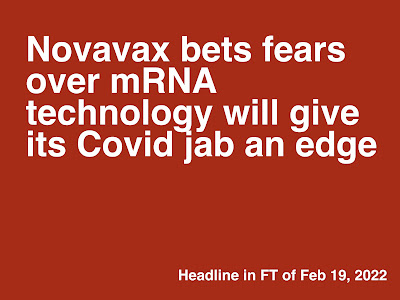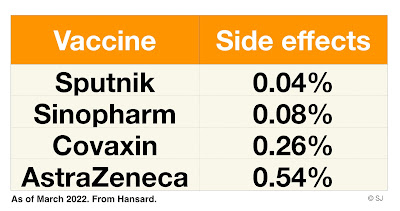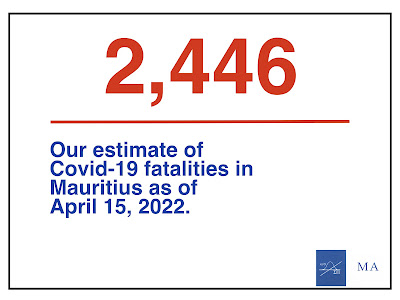Numero Uno. The brand new Sputnik Nasal Vaccine. Both as a booster and as a 2-dose regimen. We know for a fact that different vaccines not only don’t have the same effectiveness in keeping us away from hospitals and the morgue but they are also not terribly good at preventing infection and transmission. As Israel found out even after a fourth dose of Pfizer. That’s because we have no soldiers to prevent Covid-19 from living rent-free in our noses and spreading around. But as the diagram shows – pulled from Sputnik’s Twitter handle along with the pic of how it is administered – a nasal vaccine changes all that by building a wall of immunity at the top of our airways. It would also make our vaccination campaigns a lot more efficient and provide most Mauritians with a better immune response through heterologous boosting. Plus as it’s a spray no needles are involved.
Friday, April 22, 2022
3 Sputnik Products Government Should Buy Right Away
The Sputnik nasal spray offers a higher level of protection against Covid-19 by building a wall of immunity at the entry point of the virus.
Administration of the Sputnik nasal vaccine
is straightforward. No needles are used.
Dezyem. The Sputnik Light vaccine. As a booster or a standalone jab. As 36,956 Mauritians have already had at least the first dose of Sputnik V (which in fact is the Sputnik Light shot) it makes a lot of sense to offer them the option of continuing with the same excellent vaccine. According to Gamaleya, its maker, the Sputnik booster is supposed to last 12 months. This compares favourably with the 3 to 6 months the Pfizer booster will offer protection. Surely the authorities are not planning to jab the population with a 6th dose of a vaccine designed for the Wuhan strain that’s not exactly dominant now by this December?
Third. Sputnik-M jab for adolescents (12-17). It’s a 2-dose vaccine just like Sputnik V except that its concentration is 5X lower. Buying the Sputnik-M vaccine would be consistent with the recent decision of government to add a non-mRNA vaccine like Novavax to its list of approved vaccines.
There are issues with mRNA
vaccines like Pfizer and Moderna.
Government Should Update Its Vaccine
Strategy With Official Data It Has Published
It appears that government hasn’t been buying vaccines for quite some time relying totally on shipments that are mufta instead. This has caused a 100% dependence on mRNA vaccines. A very risky decision while it kept collecting Rs2 on each litre of petroleum products and as the Covid-19 death toll approaches 2,500. It is way better off checking our local experience with vaccines so far and adjusting the vaccine strategy accordingly. Especially two facts. One is that unlike the other jabs (see chart) nobody who had done the Sputnik vaccine had died from Covid as of November 7, 2021 – these numbers need to be updated via a parliamentary question ASAP. Two, as we learned last week from our National Assembly, Sputnik had the lowest rate of side effects of four vaccines used in Mauritius.
If government doesn’t want to buy these Sputnik products – the best vaccine against death and side effects according to its own data and confirmed elsewhere – because it has spent too many billions of our national reserves uselessly or hasn’t heard of long Covid yet then maybe it should give citizens who have already been vaccinated with or view the Russian jabs as among the best in the world the option of paying for it. And make it widely available.
Finally, given that Pfizer has now made several billions of dollars of profit there’s no need for a consent form as if its vaccine is faulty it should be held accountable. Incidentally that’s the reason why Moderna and Pfizer were not approved by Indian authorities.
Sputnik had the lowest rate of side effects
in Mauritius confirming what has been
observed in a number of countries.
This is a lot higher than the official figure that government doesn’t publish in Mauritius
but sends to the WHO.
The Sputnik nasal spray should help us keep long Covid and hospitalisation to a minimum accelerating a return to normality.
Subscribe to:
Post Comments (Atom)







No comments:
Post a Comment